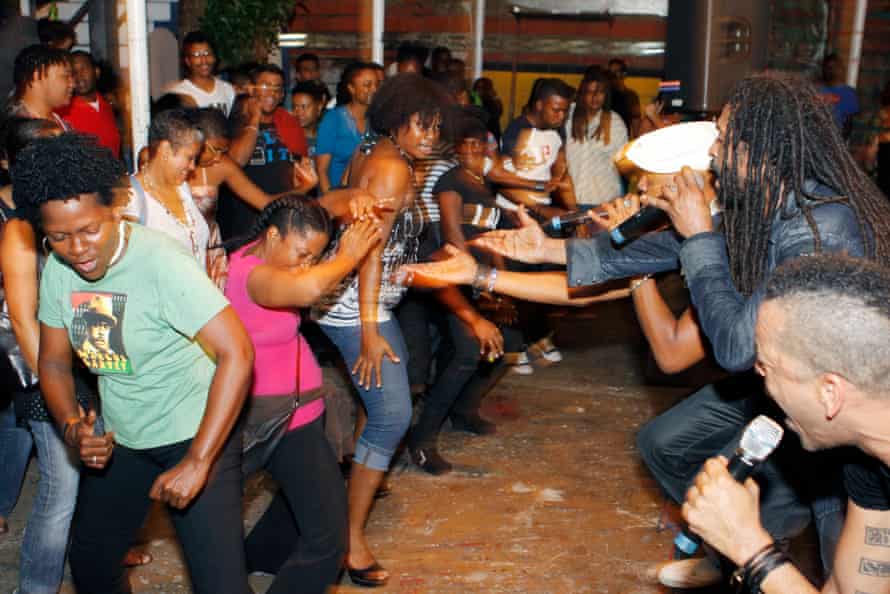You would expect a song called Dancing Shoes to celebrate the unfettered joy of a good boogie, but Network Rapso Riddum Band’s 1981 track did quite the opposite. Lead vocalist Brother Resistance – whose death on 13 July sent shockwaves through the Caribbean music community – used Dancing Shoes to castigate his fellow Trinidadians for embracing foreign forms such as disco, delivering caustic lyrics in a flow laden with preacherly indignation.
The song heralded the arrival of a new hybrid sound in Trinidad and Tobago – one that hasn’t had quite the global impact of dancehall, reggae or other Caribbean styles but which is the source of some of its most fascinating and political music, dubbed “rapso” for its melding of rap and soca.
The bedrock of the rhythm was a pulsating variant of the predominant soca style that reflected the African and Indian origins of the island’s inhabitants, with a bright steel-pan melody clearly signalling their current location, though the bass was couched in funk, and the disjointed kick drum pointed to Afrobeat. The vocals, meanwhile, took the social consciousness and reportage of calypso and gave it the rhythmic heft and confrontational slant of nascent rap music in the US.
“Rapso emerged in the depressed communities of east Port of Spain after the 1970s,” says Wendell Manwarren of the group 3canal, who have been keepers of the rapso flame since the late 1990s. “The gist in its early days was that sense of self-determination and pride in self. With Dancing Shoes, Brother Resistance set himself up as a commentator and sharp social critic.” Manwarren says that because of their lower class background and embrace of Rastafarian elements, rapso was viewed “with a little disdain from certain quarters. But somehow Brother Resistance was able to transcend that.”
Critical songs such as Ring De Bell, Cyar Take That and climate change clarion Mother Earth were all significant hits, and in addition to helping band members Brother Book and Karega Mandela to score success of their own, Brother Resistance mentored younger artists who helped keep rapso contemporary. Although the form was unnamed until the release of Dancing Shoes, Brother Resistance saw earlier figures as the true rapso progenitors.
“Brother Resistance said: we are doing rapso music, which is the power of the word in the rhythm of the word, but we are not the innovators,” says Manwarren. A key inspiration was Lancelot Layne’s 1971 song Blow ’Way, and its lines: “Don’t believe what foreigners do is better than you because that ain’t true / it’s a mental block that’s hard to unlock.”
Manwarren explains: “It was positing the idea that we needed to invest in ourselves. Independence [from the UK] had resulted in the disappointment that brought about the black power movement – black people weren’t seeing themselves represented in certain arenas. Around that same period, Cheryl Byron was the equivalent of a dub poet, with hardcore black consciousness and knowledge of self, and the first person to take this form into the calypso tent.”

As the influence of Layne and Byron fed a growing rapso scene, Brother Resistance began touring overseas, recording his landmark debut album Rapso Take Over at the Brent Black Music Co-Op in London in 1986, which brought the style a whole new audience. He opened the Uprising Culture House on All Saints Road in Notting Hill, west London, during a time of heightened racial tension and frequent police harassment (as shown in the BBC television documentary Carnival Street). He also staged spoken-word events through the Apples and Snakes collective with fellow poets such as Benjamin Zephaniah, before dividing his time between Trinidad and Germany.
Then, during the early 1990s, rapso’s second wave harnessed the production values of east coast US hip-hop and Jamaican dancehall, as heard in the work of Kindred, Homefront, and Ataklan.
“Our rapso was different because we were of that rap generation, so our music was a hybrid of hip-hop and Trini styles,” says Omari Ashby of Kindred, whose debut release, Dis Trini Could Flow, became a sensation in 1992. “My older brother was deeply into Run-DMC and I was more into Whodini, and when Public Enemy came out, that was it for me. It was saying everything I was thinking.” Ashby also grew up in a house where his parents “had every type of music, so in my mind [calypso singer] Mighty Shadow was just as big a star as Michael Jackson. At any given moment I would listen to Steel Pulse, Boy George, [calypso singers] Black Stalin and Brother Valentino. So Dis Trini Could Flow was stating that you could sound like yourself and still mashup the dance.” Ashby says that some of rapso’s old guard were saying “these guys are spoiling the thing, this new style is not really rapso. But Brother Resistance saw it as the youth getting their voice.”
“That second wave had a lot more of a hip-hop vibe, but many of us say that rapso is not a sound per se; it’s a philosophy, an attitude, a stance,” says Manwarren. “Kindred delivered Dis Trini Could Flow to a stomping hip-hop beat, but with that extra Trini inflection; Homefront was saying things such as, ‘Give yourself a chance, let your spirit start to dance, free yourself to be yourself,’ and Ataklan came with a whole different energy, threatening to burn down everything with fire.”
Manwarren’s 3canal spearheaded the further rapso wave that arose in the late 1990s, taking the form in another direction through sung lyrics with three-part harmonies after being active in a theatre troupe and forming a j’ouvert band. The latter featured at the intense cultural outpouring of j’ouvert that begins each carnival in the wee hours of the Monday before Ash Wednesday, in which revellers adorn their bodies with paint, mud or oil before dancing with reckless abandon in a symbolic re-enactment of their ancestors’ emancipation from slavery and indentured labour.
“When we came on the scene with our j’ouvert band, I had been writing something in an attempt to define the concept, and Brother Resistance said that what I was writing was in a rapso form,” says Manwarren. “In short order, we were recording background vocals for him in the studio and the next thing you know, we had a recording deal.”

3canal’s 1997 hit Blue celebrated j’ouvert as a linchpin of carnival culture, and Talk Yuh Talk attacked political hypocrisy, though some felt their style strayed too far from the roots. “3canal’s approach had a lot of harmonies and singing, but with rapso energy, so that widened the definition,” says Ashby. Still rooted in Brother Resistance’s innovations, the broader style dominated Trinidadian music into the noughties, “and I would argue it still dominates now,” Ashby suggests. “It is being subsumed under soca, but the vocal approach is the same.”
“Trinidad is a small, fickle, fecund society,” Manwarren concludes. “People are always looking for the next new thing, so even though there are other forms that we have now, it’s still rapso in another sense. I think that was the genius of Brother Resistance because he knew that if it all had to sound like his stuff, that would be the end of it. Many young artists today credit his encouragement as being significant in their development. Brother Resistance was powerful, silent and always had a ready smile; he didn’t say much, but spoke volumes with his eyes, and he’s responsible for a lot of the good vibrations in the space. Give thanks for his being.”
from WordPress https://ift.tt/3Bn36oR
via IFTTT






No comments:
Post a Comment